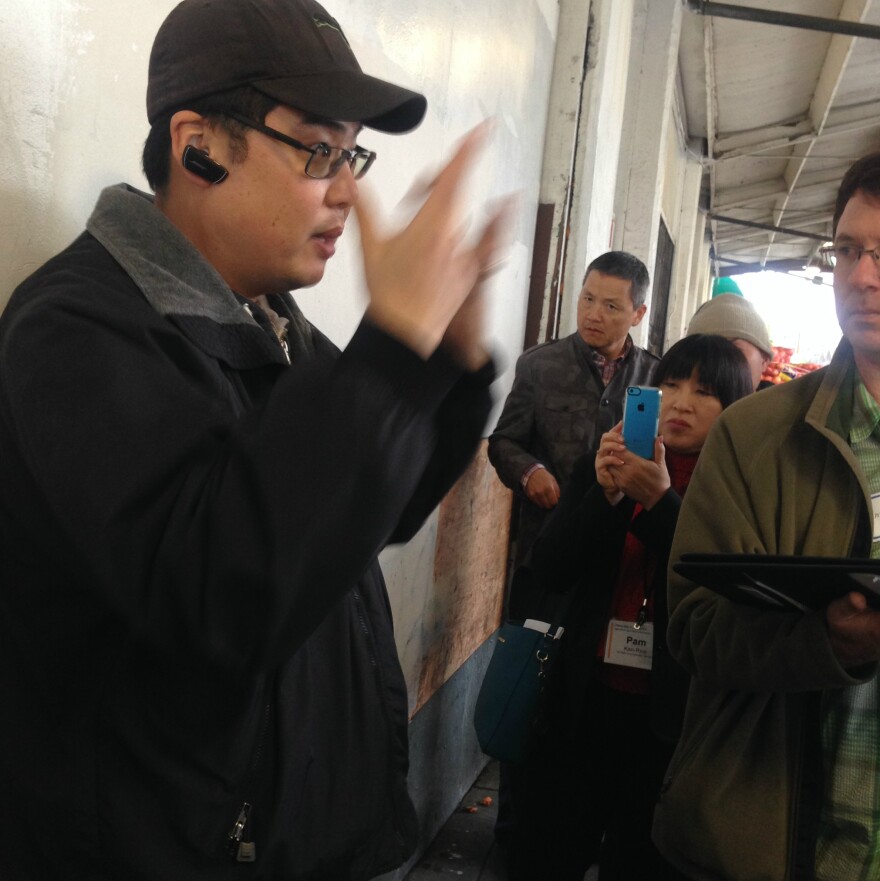Many small farmers have success selling their produce at farmers markets, but selling to larger food distributors can be difficult. FM89’s Ezra David Romero reports on a new project that hopes to connect one group of Southeast Asian growers with Bay Area buyers.

Small Hmong farms dot Fresno County growing specialty crops like the red date jujube, lemon grass and bitter melon. But more often than not, these farmers lack the resources and the know how to get their produce to larger markets.
The Agricultural Sustainability Institute at UC Davis would like to change that farmer to market relationship.
Michael Yang with the UC Cooperative Extension in Fresno led a ‘workshop on wheels’ bus tour to Oakland and Berkeley last week for around 30 Hmong farmers.
YANG: “It’s kind of an eye-opener for them. If they want to market to bigger distributors they have to come together, put their product together and work from there.”

The idea for the bus tour began on Yang’s weekly Hmong radio show about farming. He says he wants to show these growers they don’t have to limit their selling to just farmers markets. Instead, they can sell their vegetables to produce brokers like Chris Charlesworth of LA and SF Specialty Produce.
Pao Her from Sanger was one of the farmers on the tour. He took the time to show me some of the vegetables he grows on his farm.
ROMERO: “What is this?” HER: “Sinqua.” ROMERO: “Is it like a cucumber?” HER: “No it’s sweet, like a zucchini. You can make a salad with it, barbecue or put it in soup or stir fry.”
It’s conversations like this about produce, where it comes from, and how to use it, that Yang says he wants to foster.

His goal is to get Hmong farmers in the Valley to realize they’re missing out on markets they could capitalize on.
YANG: “A lot of them recognize that’s long bean, that’s lemon grass or bitter melon. And who grows these?” ROMERO: “So they’re wondering why it’s not them.” YANG: “Right.”
One of the stops on the tour was at Pacific Rim and Produce in Oakland that serves supermarkets, restaurants, hotels and casinos. Here’s owner John Wong.
WONG: “Don’t do what people tell you to grow that you’re not good at. Do the best you can growing the product where your area is good at.”
He works with small farmers so they can sell their produce to big distributors like his company. He says many South East Asian farmers make the mistake of following trends in farming instead of really understanding that providing consistent quality produce keeps the market steady.
WONG: “There are four things as a grower you need to know. One thing is growing the products good. The second thing is marketing. The third thing is commitment and the fourth is branding. And I’m pretty sure all these growers here don’t have none of that.”

Twenty-five-year old Xia Chang was one of few young farmers on the tour.
CHANG: “We have an older generation that they’re farming and providing for a certain amount of people and as time goes by they’re not going to be there. Who’s going to replace them? So I kind of see there is opportunity for someone like me.”
Chang runs a 13-acre farm in Fresno County and would like to one day farm a 100-acre plot of land.
CHANG: “If we’re comfortable with what we are doing, then in 10 years we’ll be the same. I guess trying new things, new tools is probably the key for Hmong farmers.”
Chang says he hopes events like this will help convince Hmong farmers to embrace new technology, branding and ways to better market the specialty goods they grow.






